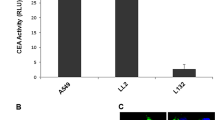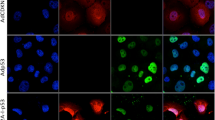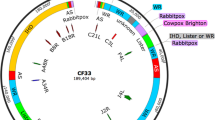Abstract
We have recently isolated carcinoembryonic antigen (CEA) promoter regions consisting of 419 bp and 204 bp from CEA-producing human colorectal carcinoma (CRC). We constructed CEA419/CD and CEA204/CD retroviruses carrying the bacterial cytosine deaminase (CD) gene directed by the CEA promoter regions. pCD2 retroviruses carrying the CD gene directed by the retrovirus long terminal repeat promoter were also used. CEA419/CD or CEA204/CD retrovirus-infected CRC cells were found to be susceptible to 5-fluorocytosine (5-FC), while non-CRC cells infected with the same retroviruses were not. CD-transduced CRC xenografts in nude mice were sensitive to 5-FC treatment, resulting in arrest of tumor growth. When mice with intraperitoneally disseminated CRCs were given intraperitoneal injections of CEA419/CD retrovirus-producing cells followed by 5-FC treatment, significantly prolonged survival rates were observed compared with animals injected with pCD2 retrovirus-producing cells followed by 5-FC treatment. Importantly, bone marrow suppression was not observed in animals injected with CEA419/CD retrovirus-producing cells and 5-FC, while profound bone marrow suppression was observed in those injected with pCD2 retrovirus-producing cells and 5-FC. These results indicate that effective and safe in vivo gene therapy for advanced CRC may be feasible by transferring the CD gene controlled by the CEA promoter followed by 5-FC treatment.
This is a preview of subscription content, access via your institution
Access options
Subscribe to this journal
Receive 12 print issues and online access
$259.00 per year
only $21.58 per issue
Buy this article
- Purchase on Springer Link
- Instant access to full article PDF
Prices may be subject to local taxes which are calculated during checkout




Similar content being viewed by others
References
Finkelstein SD, Sayegh R, Christensen S, Swalsky PA . Genotypic classification of colorectal adenocarcinoma Cancer 1993 71: 3827–3838
Cortesi E et al. Advanced colorectal cancer J Surg Oncol 1991 48 (Suppl. 2): 112–115
Turk PS, Wanebo HJ . Results of surgical treatment of nonhepatic recurrence of colorectal carcinoma Cancer 1993 71: 4267–4277
Vaughn DJ, Haller DG . Nonsurgical management of recurrent colorectal cancer Cancer 1993 71: 4278–4292
Calabresi P, Chabner BA . Antineoplastic agents. In: Gilman AG, Rall T, Nies AS, Taylor P (eds). Goodman and Gilman’s The Pharmacological Basis of Therapeutics, 8th edn Pergamon Press: New York 1990 1209–1263
Bennett J . Antifungal agents In: Gilman AG, Rall T, Nies AS, Taylor P (eds) . Goodman and Gilman’s The Pharmacological Basis of Therapeutics, 8th edn Pergamon Press: New York 1990 pp 1165–1181
Nishiyama T et al. Antineoplastic effects in rats of 5-fluorocytosine in combination with cytosine deaminase capsules Cancer Res 1985 45: 1753–1761
Mullen CA, Coale MM, Lowe R, Blaese RM . Tumors expressing the cytosine deaminase suicide gene can be eliminated in vivo with 5-fluorocytosine and induce protective immunity to wild-type tumor Cancer Res 1994 54: 1503–1506
Huber BE et al. Metabolism of 5-fluorocytosine to 5-fluorouracil in human colorectal tumor cells transduced with the cytosine deaminase gene: significant antitumor effects when only a small percentage of tumor cells express cytosine deaminase Proc Natl Acad Sci USA 1994 91: 8302–8306
Mullen CA, Kilstrup M, Blaese M . Transfer of the bacterial gene for cytosine deaminase to mammalian cells confers lethal sensitivity to 5-fluorocytosine: a negative selection system Proc Natl Acad Sci USA 1992 89: 33–37
Austin EA, Huber BE . A first step in the development of gene therapy for colorectal carcinoma: cloning, sequencing, and expression of Escherichia coli cytosine deaminase Mol Pharmacol 1992 43: 380–387
Huber BE et al. In vivo antitumor activity of 5-fluorocytosine on human colorectal carcinoma cells genetically modified to express cytosine deaminase Cancer Res 1993 53: 4619–4626
Kuriyama S et al. Bacterial cytosine deaminase suicide gene transduction renders hepatocellular carcinoma sensitive to the prodrug 5-fluorocytosine Int Hepatol Commun 1995 4: 72–79
Hirschowitz EA et al. In vivo adenovirus-mediated gene transfer of the Escherichia coli cytosine deaminase gene to human colon carcinoma-derived tumors induces chemosensitivity to 5-fluorocytosine Hum Gene Ther 1995 6: 1055–1063
Consalvo M et al. 5-Fluorocytosine-induced eradication of murine adenocarcinomas engineered to express the cytosine deaminase suicide gene requires host immune competence and leaves an efficient memory J Immunol 1995 154: 5302–5312
Richards CA, Austin EA, Huber BE . Transcriptional regulatory sequences of carcinoembryonic antigen: identification and use with cytosine deaminase for tumor-specific gene therapy Hum Gene Ther 1995 6: 881–893
Ohwada A, Hirschowitz EA, Crystal RG . Regional delivery of an adenovirus vector containing the Escherichia coli cytosine deaminase gene to provide local activation of 5-fluorocytosine to suppress the growth of colon carcinoma metastatic to liver Hum Gene Ther 1996 7: 1567–1576
Dong Y et al. In vivo replication-deficient adenovirus vector-mediated transduction of the cytosine deaminase gene sensitizes glioma cells to 5-fluorocytosine Hum Gene Ther 1996 7: 713–720
Rowley S et al. Cytosine deaminase gene as a potential tool for the genetic therapy of colorectal cancer J Surg Oncol 1996 61: 42–48
Kanai F et al. In vivo gene therapy for α-fetoprotein-producing hepatocellular carcinoma by adenovirus-mediated transfer of cytosine deaminase gene Cancer Res 1997 57: 461–465
Gold P, Freedman SO . Demonstration of tumor-specific antigens in human colonic carcinomata by immunological tolerance and absorption techniques J Exp Med 1965 121: 439–462
Egan ML, Pritchard DG, Todd CW, Go VLW . Isolation and immunological and chemical characterization of carcinoembryonic antigen-like substances in colon lavages of healthy individuals Cancer Res 1977 37: 2638–2643
Baranov V, Yeung M-W, Hammarstrom S . Expression of carcinoembryonic antigen and nonspecific cross-reacting 50-kDa antigen in human normal and cancerous colon mucosa: comparative ultrastructural study with monoclonal antibodies Cancer Res 1994 54: 3305–3314
Cao G et al. Comparison of carcinoembryonic antigen promoter regions isolated from human colorectal carcinoma and normal adjacent mucosa to induce strong tumor-specific gene expression Int J Cancer 1998 78: 242–247
Abbasi AM et al. Localization of CEA messenger RNA by in situ hybridization in normal colonic mucosa and colorectal adenocarcinomas J Pathol 1992 168: 405–411
Kim J et al. Expression of carcinoembryonic antigen and related genes in lung and gastrointestinal cancers Int J Cancer 1992 52: 718–725
Jothy S, Yuan S-Y, Shirota K . Transcription of carcinoembryonic antigen in normal colon and colon carcinoma. In situ hybridization study and implication for a new in vivo functional model Am J Pathol 1993 143: 250–256
Tanaka T et al. Adenovirus-mediated prodrug gene therapy for carcinoembryonic antigen-producing human gastric carcinoma cells in vitro Cancer Res 1996 56: 1341–1345
Lan K-H et al. In vivo selective gene expression and therapy mediated by adenoviral vectors for human carcinoembryonic antigen-producing gastric carcinoma Cancer Res 1997 57: 4279–4284
Ozaki T et al. Gene therapy for carcinoembryonic antigen-producing human lung cancer cells by cell type-specific expression of herpes simplex virus thymidine kinase gene Cancer Res 1994 54: 5258–5261
Chen C-J, Li L-J, Maruya A, Shively JE . In vitro and in vivo footprint analysis of the promoter of carcinoembryonic antigen in colon carcinoma cells: effect of interferon-γ treatment Cancer Res 1995 55: 3873–3882
Mullen CA, Petropoulos D, Lowe RM . Treatment of microscopic pulmonary metastases with recombinant autologous tumor vaccine expressing interleukin 6 and Escherichia coli cytosine deaminase suicide genes Cancer Res 1996 56: 1361–1366
Miller DG, Adam MA, Miller AD . Gene transfer by retrovirus vectors occurs only in cells that are actively replicating at the time of infection Mol Cell Biol 1990 10: 4239–4242
Miller AD, Rosman GJ . Improved retroviral vector for gene transfer and expression BioTechniques 1989 7: 980–990
Yoshimatsu T, Tamura M, Kuriyama S, Ikenaka K . Improvement of retroviral packaging cell lines by introducing the polyomavirus early region Hum Gene Ther 1998 9: 161–172
Kuriyama S et al. Bystander effect caused by suicide gene expression indicates the feasibility of gene therapy for hepatocellular carcinoma Hepatology 1995 22: 1838–1846
Kuriyama S et al. Gene therapy for the treatment of hepatoma by retroviral-mediated gene transfer of the herpes simplex virus thymidine kinase Int Hepatol Commun 1993 1: 253–259
Marquardt DW, Siam J . An algorithm for least square estimation of non-linear parameters J Soc Indust Appl Math 1963 11: 431–441
Author information
Authors and Affiliations
Rights and permissions
About this article
Cite this article
Cao, G., Kuriyama, S., Gao, J. et al. Effective and safe gene therapy for colorectal carcinoma using the cytosine deaminase gene directed by the carcinoembryonic antigen promoter. Gene Ther 6, 83–90 (1999). https://doi.org/10.1038/sj.gt.3300823
Received:
Accepted:
Published:
Issue Date:
DOI: https://doi.org/10.1038/sj.gt.3300823
Keywords
This article is cited by
-
Evaluation of a synthetic CArG promoter for nitric oxide synthase gene therapy of cancer
Gene Therapy (2005)
-
Expression in UVW glioma cells of the noradrenaline transporter gene, driven by the telomerase RNA promoter, induces active uptake of [131I]MIBG and clonogenic cell kill
Oncogene (2001)
-
Evaluation of a new dual-specificity promoter for selective induction of apoptosis in breast cancer cells
Cancer Gene Therapy (2001)
-
Particle-mediated gene transfer into murine livers using a newly developed gene gun
Gene Therapy (2000)
-
Gene therapy strategies for the treatment of cancer. A review
Revista de Oncología (2000)



